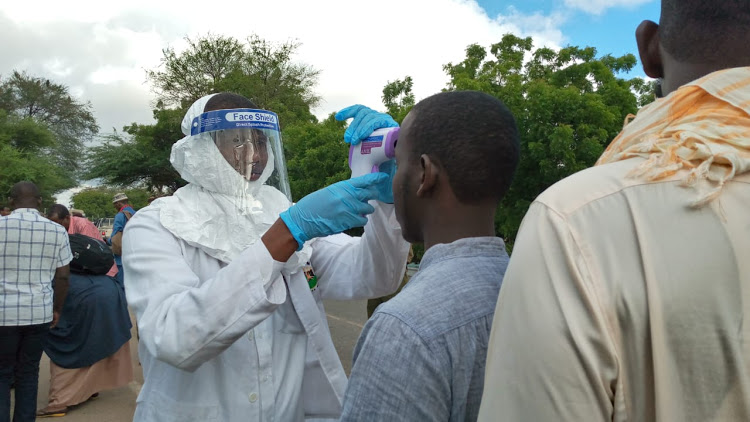COVID-19: Passengers being screened for Covid-19 symptoms. Image: STEPHEN ATARIKO Kenya spent approximately $2.4 billion close to (Sh250 billion) by end of last year to fight the social-economic pressures of Covid-19, according to the latest International Monetary Fund (IMF) report.
The summary of the country’s fiscal measures in response to the Covid-19 pandemic as compiled by IMF shows the country spent $2.3 billion on non-health measures and $100 million on healthcare.
The amount was the second-highest amongst low middle income earning countries, with Nigeria topping the chart, having spent a total of $6.4 billion or 1.5 per cent of its gross domestic product.
Kenya’s Covid-19 expenditure was 2.4 per cent of the GDP. It was followed by Uzbekistan which spent $2.2 billion.
The details come at the time the National Emergency Response Committee on Covid-19 formed by President Uhuru Kenyatta and the National Treasury are under pressure to account for funds received to mitigate the crisis.
The Covid-19 Fund committee chaired by the East African Breweries Limited MD Jane Karuku received billions of funds and donations from corporates, government agencies and individuals for the emergency kitty to help in containing the spread, effects and impact of the virus.
The initiative sought to support the government’s efforts in the supply of medical facilities and equipment and support for vulnerable communities with immediate needs, including food.
The country also received sizeable credit from international partners to help mitigate the economic pressures of the virus.
It received $1billion (Sh106 billion) from World Bank to support its budget and cushion the economy in May, less than two weeks after IMF gave channeled $739 million (Sh79 billion) Rapid Credit Facility to help the country cover the balance of payments shortfalls.
Two weeks later, it received €188 million (Sh22 billion) from African Development Bank (AFDB) to support the government’s efforts to respond to the Covid-19 pandemic and mitigate the related economic, health and social impacts.
According to IMF, The global fiscal support reached nearly $14 trillion as of end-December 2020, up by about $2.2 trillion since October 2020. ”This means focusing on the hardest-hit and most vulnerable, including the poor, women, and informal workers, and firms that are likely to remain viable after the crisis or are systemically important to the economy,” IMF says. It comprises $7.8 trillion in additional spending or (to a lesser extent) measures to forgo revenues and $6 trillion in guarantees, loans, and equity injections.The IMF report adds that most countries […]
